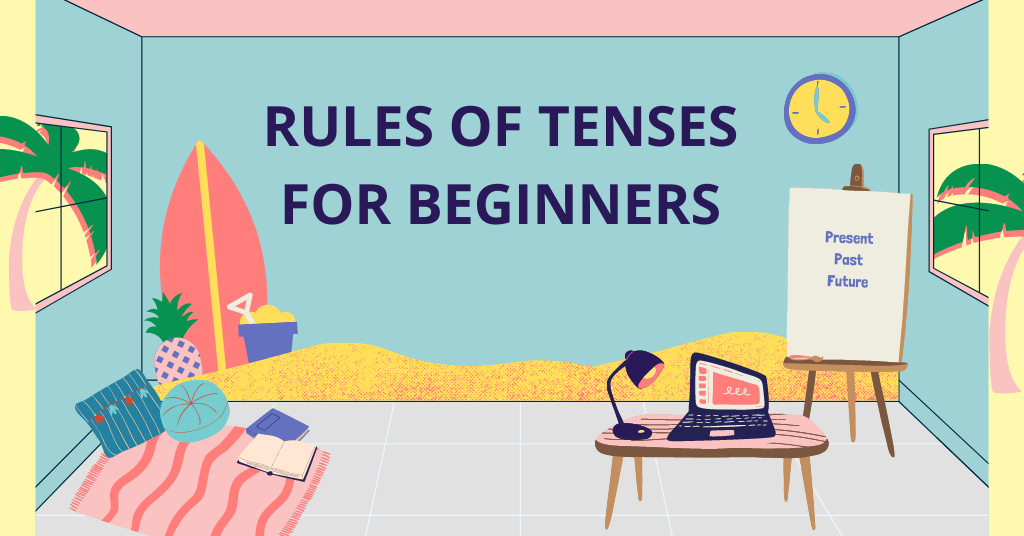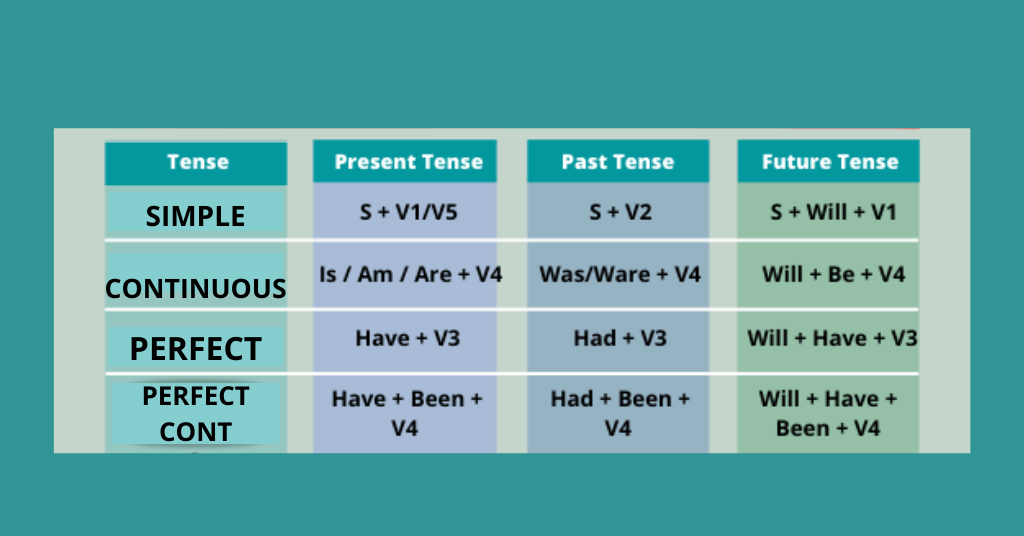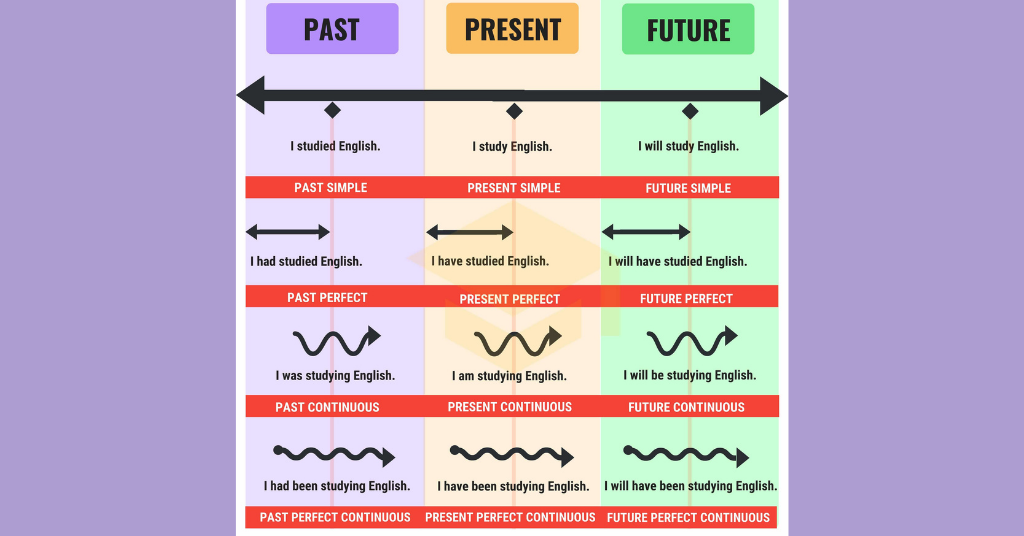Do you find tenses a bit overwhelming even after learning them so many times? If so, then scroll down to get the complete guide to rules of tenses in the next 10 minutes. Many students are unable to write and talk appropriately in English due to a lack of understanding of tenses. It’s not always a lack of confidence that hinders students from conversing in English, but rather the concerns that linger in their minds regarding the grammar. Let us make your learning easier by introducing you to the easiest way to learn tenses.

What Are Tenses In A Single Sentence?
The verb form that indicates the time and manner of the action is known as tense.
Now, let’s learn about the rules of tenses
What Are The Types Of Tenses?
There are 3 kinds of tenses in English –
PRESENT – This tense refers to the present time.
PAST – This tense refers to the past time.
FUTURE – This tense refers to the future time.
What Are The Subtypes Of Tenses?

The tenses mentioned above can be divided into four subparts. Let’s learn its verb forms and the rules of tenses.
1. Present Simple Tense
– Sub+V1+s/es+Obj
– Present simple is used with I/You/We/They/He/She/It
– Example for Singular – I drink lemongrass tea every morning.
– Example for Plural – Children play outside after school.
– Note – For I/We/They ( You don’t use s/es ) and For He. She/It ( You use s/es)
2. Present Continuous Tense
-Sub+is/am/are+V1+ing+Obj
– Example 1 – He is eating strawberry ice cream right now.
– Example 2 – I am watching my favorite Netflix series.
– Example 3 – It’s raining heavily outside.
3. Present Perfect Tense
– Singular – Sub+has+V3+Obj
– Plural – Subject+have+V3+Obj
– Example for Singular – Vanshika has visited this restaurant 4 times in her life.
– Example for Singular – I have taught Spanish to many students.
– Example for Plural – I have eaten my dinner, and you may rest now.
– Example for Plural – We have seen 4 shows this week.
– Note – For I/You/We/They ( you use have ) For He/She/It ( You use have )
4. Present Perfect Continuous Tense
– Singular – Sub+has been/+V1+ing+Obj
– Example – She has been completing her assignment since morning.
– Example – He has been playing cricket since he was a child
– Plural – Subject+have been+V1+ing +Obj
– Example – They have been working on the assignment since morning.
– Example – We have been living in this village for 6 years.
– Note – For He/She/It ( You use has ) For I/You/We/They ( You use have )
5. Simple Past Tense Rules
– Sub+V2+Obj
– Example 1 – He went to his village last night.
– Example 2 – Diya gave a ring to his fiance.
– Example 3 – My father built this house in 1998.
6. Past Continuous Tense Rules
– Singular – Sub+was+V1+ing+Obj
– Example – I was having my favorite dessert when Radhika came.
– Plural – Sub+were+V1+ing+Obj
– Example – They were going shopping when the guest arrived.
– Note – For I/He/She/It ( You use was ) For You/We/They ( You use were )
7. Past Perfect Tense Rules
– Sub+had+V3+Obj
– Example – Somika had left the party when we arrived.
– Example – I was sick because I had eaten too much at the party last night.
8. Past Perfect Continuous Tense Rules
– Sub+had been+V1+ing+Obj
– Example – They had been preparing for the competition for 2 months.
– Example – I had been waiting for 2 hours when the boss arrived.
9. Simple Future Tense Rules
– Sub+will+V1+Obj
– Example – I think CSK will win the match
– Example – I will cut vegetables for dinner.
– Example – You should visit Worlds of wonder with your kids. They will love it.
10. Future Continuous Tense Rules
– Sub+will be+V1+ing+Obj
– Example – I will be driving the car at 4:00 am.
– Example – You will be writing for the government exam tomorrow.
11. Future Perfect Tense Rules
– Sub+will have+V3+Obj
– Example – We will have gone to Goa by Thursday.
– Example – I will have saved 50 Lakhs by august.
12. Future Perfect Continuous Tense Rules
– Sub+will have been+V1+ing+Obj+since+for time
– Example – By June, Astha will have been saving money for 10 months.
– Example – She will have been cooking food for 30 minutes.
Related Article: Vedic Mathematics Sutras to Improve Your Addition and Multiplication
Now, Let’s dig deeper to understand all the rules of tenses.

Rules Of Tenses – Usage Of Simple Present Tense Rules
1. The rules of tenses state here that present tense is used when you talk about something which happens as a habit, regularly, or happens always.
Example – He sings melodiously.
2. You employ simple present tense rules to state facts and things that are true for a long time. Example
Example – He is Jhanvi’s brother.
3. You use it to express thoughts and feelings
Example – I feel cold every night.
4. When you express universal truths.
Example – The Sun rises in the East.
5. When you express facts that are true in the present.
Example – She practices dance to be happy and fit.
6. You use a simple present when you need to express your planned future actions concerning events or journeys.
Example – We leave for Australia next month.
7. You use it in commentaries or sports events.
Example – Dhoni hits a six.
8. You also use it in expressing news.
Example – Rahul gives a speech for the election.
Rules Of Tenses – Present Continuous Tense Rules
1. To convey an action occurring at or near the moment of speaking.
Example – I am listening to music.
2. To express a current action that is not occurring at the moment of speaking. –
Example – I want to work with great businesses. So, I am learning Japanese.
3. When expressing a specific arrangement shortly, you employ present continuous tense rules.
Example – I am leaving for my cousin’s wedding next week.
4. To express an action that begins before a given time and continues after it.
Example – At 6:00 pm, I am writing my assignment.
5. To express some habit.
Example – Sakshi is always in the mood for a fight.
Rules Of Tenses – Present Perfect Tense
1. Here you use just more often and it tells the recently completed action.
Example – I have just completed my office work.
2. When you express a past action without mentioning the significant time.
Example – I made a batch of fresh cookies for you.
3. When you express past events and actions whose results are still visible or felt.
Example – The dog has ruined my work desk.
4. The present perfect tense rules say that when you express a past action that continues up to the present.
Example – I have learned singing for 5 months.
Rules Of Tenses – Present Perfect Continuous Tense
1. It is used to express an action that started sometime in the past and is still going on.
Example – She has been working since morning.
2. You use present perfect when an action is already finished but its results are still visible.
Example – I have been working. That’s why I look tired.
Rules Of Tense – Simple Past
1. To express situations or actions that are complete.
Example – He worked in France from 1998-to 2020.
2. You use a simple past when you express repeated events in the past.
Example – I always loved Maria.
3. To express a past habit.
Example – I liked to collect different currencies in my childhood.
4. To express an action that lasted for some time in the past.
Example – Rajesh purchased a ring four years ago.
Rules Of Tenses – Past Continuous Tense
1. Describes an action that occurred at some point in the past.
Example – I was having dinner at 9:00 pm.
2. To convey two or more acts at the same time.
Example – While I was eating my food, my father was waiting for me on the road.
3. To express a pattern of past behavior. ( you use words like always or continually )
Example – Maria was always playing with Rahul during her childhood.
4. Use in description
Example – I was having my food, and my brother was playing around. The entire audience was looking at him.
Rules Of Tenses – Past Perfect Tense
1. To depict events that occurred before a specific moment in time, you use the past perfect tense rules.
Example – At 9:00 pm, Diya had completed her work.
2. Express a previous action that occurred before another previous action. –
Example – I had already done my homework when my mother prepared another set of questions for me to answer.
3. To express unmet desires from the past.
Example – I wish I had gone on that trip.
4. You use past perfect tense to depict past impossible conditions.
Example – If I had worked harder, I would have answered every question in the exam.
Rules Of Tenses – Past Perfect Continuous Tense
1. To represent an action that started before a specific period in the past and continued up to or stopped shortly before that moment.
Example – They had been screaming around when the mother arrived.
2. To express a repeated action.
Example – He had been trying to work on the project.
Rules Of Tense – Simple Future Tense
1. A simple future is used to indicate an action or occurrence that has yet to occur.
Example – I will go shopping tomorrow.
2. To make a prediction or give an opinion about what might happen.
Example – I think Dhoni’s team will win the match.
3. A simple future is used to discuss facts and plans that will not change.
Example – I will leave for Dubai next month.
4. You can also utilize it when talking about your plans/ ambitions.
Example – I will start studying for UPSC next month.
Rules Of Tenses – Future Continuous Tense
1. This tense is used to express an action that will take place in the normal course of events.
Example – I will be going for a trek in the morning.
2. To describe an action that will take place at some point in the future.
Example – Tomorrow, we will start our trekking for 10kms.
Rules Of Tense – Future Perfect Tense
1. To express a future action that will be accomplished by a specific time.
Example – By 2023, He will have completed his master’s degree.
Rules Of Tense – Future Perfect Continuous
1. To describe an action as ongoing over a period that will be completed in the future.
Example – By next year, we will be visiting 3 countries.
Related Article: A Comprehensive Guide On The 6 Levels Of CEFR
Conclusion
The most important aspect of the English language is “tense” You may not be able to write or talk correctly if you are unfamiliar with tenses. Tenses are the fundamentals of the language that will aid you in developing a firm grasp of the language.
This article is written for novices, and by the end of it, you will understand how to utilize the rules of tenses in a sentence confidently. If you want to learn more about such things, keep checking PiggyRide’s blog section. In addition, if you want to learn grammar from one of our certified and experienced teachers, check out our online English classes and schedule a FREE 1:1 sample class right away!


Leave a Reply